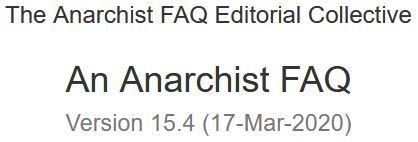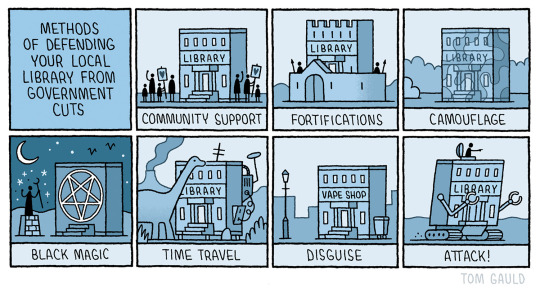#libraries
Text






Mobile Bookshop Art l lulumoonowlbooks
99 notes
·
View notes
Text
#green moodboard#libraries#kara danvers#relatable#girls with tattoos#dean winchester#donald glover#anime scenery#liz vicious#agent carter#sabrina lynn
122 notes
·
View notes
Text

Happy World Book Day! 📚
In 1917 as the country entered #WWI, the Executive Board of the
American Library Association created a Committee on Mobilization and War Service Plans with the mission to provide books and periodicals to military personnel at home and abroad.
51 notes
·
View notes
Text
As a former librarian and booklover I cannot overlook such an important day:)
Happy #WorldBookDay2024 📚

39 notes
·
View notes
Text

A.2.8 Is it possible to be an anarchist without opposing hierarchy?
No. We have seen that anarchists abhor authoritarianism. But if one is an anti-authoritarian, one must oppose all hierarchical institutions, since they embody the principle of authority. For, as Emma Goldman argued, “it is not only government in the sense of the state which is destructive of every individual value and quality. It is the whole complex authority and institutional domination which strangles life. It is the superstition, myth, pretence, evasions, and subservience which support authority and institutional domination.” [Red Emma Speaks, p. 435] This means that “there is and will always be a need to discover and overcome structures of hierarchy, authority and domination and constraints on freedom: slavery, wage-slavery [i.e. capitalism], racism, sexism, authoritarian schools, etc.” [Noam Chomsky, Language and Politics, p. 364]
Thus the consistent anarchist must oppose hierarchical relationships as well as the state. Whether economic, social or political, to be an anarchist means to oppose hierarchy. The argument for this (if anybody needs one) is as follows:
“All authoritarian institutions are organised as pyramids: the state, the private or public corporation, the army, the police, the church, the university, the hospital: they are all pyramidal structures with a small group of decision-makers at the top and a broad base of people whose decisions are made for them at the bottom. Anarchism does not demand the changing of labels on the layers, it doesn’t want different people on top, it wants us to clamber out from underneath.” [Colin Ward, Anarchy in Action, p. 22]
Hierarchies “share a common feature: they are organised systems of command and obedience” and so anarchists seek “to eliminate hierarchy per se, not simply replace one form of hierarchy with another.” [Bookchin, The Ecology of Freedom, p. 27] A hierarchy is a pyramidally-structured organisation composed of a series of grades, ranks, or offices of increasing power, prestige, and (usually) remuneration. Scholars who have investigated the hierarchical form have found that the two primary principles it embodies are domination and exploitation. For example, in his classic article “What Do Bosses Do?” (Review of Radical Political Economy, Vol. 6, No. 2), a study of the modern factory, Steven Marglin found that the main function of the corporate hierarchy is not greater productive efficiency (as capitalists claim), but greater control over workers, the purpose of such control being more effective exploitation.
Control in a hierarchy is maintained by coercion, that is, by the threat of negative sanctions of one kind or another: physical, economic, psychological, social, etc. Such control, including the repression of dissent and rebellion, therefore necessitates centralisation: a set of power relations in which the greatest control is exercised by the few at the top (particularly the head of the organisation), while those in the middle ranks have much less control and the many at the bottom have virtually none.
Since domination, coercion, and centralisation are essential features of authoritarianism, and as those features are embodied in hierarchies, all hierarchical institutions are authoritarian. Moreover, for anarchists, any organisation marked by hierarchy, centralism and authoritarianism is state-like, or “statist.” And as anarchists oppose both the state and authoritarian relations, anyone who does not seek to dismantle all forms of hierarchy cannot be called an anarchist. This applies to capitalist firms. As Noam Chomsky points out, the structure of the capitalist firm is extremely hierarchical, indeed fascist, in nature:
“a fascist system… [is] absolutist — power goes from top down … the ideal state is top down control with the public essentially following orders.
“Let’s take a look at a corporation… [I]f you look at what they are, power goes strictly top down, from the board of directors to managers to lower managers to ultimately the people on the shop floor, typing messages, and so on. There’s no flow of power or planning from the bottom up. People can disrupt and make suggestions, but the same is true of a slave society. The structure of power is linear, from the top down.” [Keeping the Rabble in Line, p. 237]
David Deleon indicates these similarities between the company and the state well when he writes:
“Most factories are like military dictatorships. Those at the bottom are privates, the supervisors are sergeants, and on up through the hierarchy. The organisation can dictate everything from our clothing and hair style to how we spend a large portion of our lives, during work. It can compel overtime; it can require us to see a company doctor if we have a medical complaint; it can forbid us free time to engage in political activity; it can suppress freedom of speech, press and assembly — it can use ID cards and armed security police, along with closed-circuit TVs to watch us; it can punish dissenters with ‘disciplinary layoffs’ (as GM calls them), or it can fire us. We are forced, by circumstances, to accept much of this, or join the millions of unemployed… In almost every job, we have only the ‘right’ to quit. Major decisions are made at the top and we are expected to obey, whether we work in an ivory tower or a mine shaft.” [“For Democracy Where We Work: A rationale for social self-management”, Reinventing Anarchy, Again, Howard J. Ehrlich (ed.), pp. 193–4]
Thus the consistent anarchist must oppose hierarchy in all its forms, including the capitalist firm. Not to do so is to support archy — which an anarchist, by definition, cannot do. In other words, for anarchists, ”[p]romises to obey, contracts of (wage) slavery, agreements requiring the acceptance of a subordinate status, are all illegitimate because they do restrict and restrain individual autonomy.” [Robert Graham, “The Anarchist Contract, Reinventing Anarchy, Again, Howard J. Ehrlich (ed.), p. 77] Hierarchy, therefore, is against the basic principles which drive anarchism. It denies what makes us human and “divest[s] the personality of its most integral traits; it denies the very notion that the individual is competent to deal not only with the management of his or her personal life but with its most important context: the social context.” [Murray Bookchin, Op. Cit., p. 202]
Some argue that as long as an association is voluntary, whether it has a hierarchical structure is irrelevant. Anarchists disagree. This is for two reasons. Firstly, under capitalism workers are driven by economic necessity to sell their labour (and so liberty) to those who own the means of life. This process re-enforces the economic conditions workers face by creating “massive disparities in wealth … [as] workers… sell their labour to the capitalist at a price which does not reflect its real value.” Therefore:
“To portray the parties to an employment contract, for example, as free and equal to each other is to ignore the serious inequality of bargaining power which exists between the worker and the employer. To then go on to portray the relationship of subordination and exploitation which naturally results as the epitome of freedom is to make a mockery of both individual liberty and social justice.” [Robert Graham, Op. Cit., p. 70]
It is for this reason that anarchists support collective action and organisation: it increases the bargaining power of working people and allows them to assert their autonomy (see section J).
Secondly, if we take the key element as being whether an association is voluntary or not we would have to argue that the current state system must be considered as “anarchy.” In a modern democracy no one forces an individual to live in a specific state. We are free to leave and go somewhere else. By ignoring the hierarchical nature of an association, you can end up supporting organisations based upon the denial of freedom (including capitalist companies, the armed forces, states even) all because they are “voluntary.” As Bob Black argues, ”[t]o demonise state authoritarianism while ignoring identical albeit contract-consecrated subservient arrangements in the large-scale corporations which control the world economy is fetishism at its worst.” [The Libertarian as Conservative, The Abolition of Work and other essays, p. 142] Anarchy is more than being free to pick a master.
Therefore opposition to hierarchy is a key anarchist position, otherwise you just become a “voluntary archist” — which is hardly anarchistic. For more on this see section A.2.14 ( Why is voluntarism not enough?).
Anarchists argue that organisations do not need to be hierarchical, they can be based upon co-operation between equals who manage their own affairs directly. In this way we can do without hierarchical structures (i.e. the delegation of power in the hands of a few). Only when an association is self-managed by its members can it be considered truly anarchistic.
We are sorry to belabour this point, but some capitalist apologists, apparently wanting to appropriate the “anarchist” name because of its association with freedom, have recently claimed that one can be both a capitalist and an anarchist at the same time (as in so-called “anarcho” capitalism). It should now be clear that since capitalism is based on hierarchy (not to mention statism and exploitation), “anarcho”-capitalism is a contradiction in terms. (For more on this, see Section F)
#faq#anarchy faq#revolution#anarchism#daily posts#communism#anti capitalist#anti capitalism#late stage capitalism#organization#grassroots#grass roots#anarchists#libraries#leftism#social issues#economy#economics#climate change#climate crisis#climate#ecology#anarchy works#environmentalism#environment#solarpunk#anti colonialism#mutual aid#cops#police
25 notes
·
View notes
Text
Obesity: The Science, Culture, and Politics of Fatness in America
In Fall 2023, students enrolled in Dr. Margot Finn's course on the science, culture, and politics of obesity worked in groups to research and write captions for food history materials.
Most of these items were from the Special Collections Research Center's Janice Bluestein Longone Culinary Archive.
These were featured on the Shapiro Library Screens in Bert's Study Lounge.

M. L. Holbrook, Eating for Strength (New York, M. L. Holbrook & co. [c1888]). Library of Congress.
The 1888 edition of Eating for Strength, a popular 19th century work on diet written by Martin Luther Holbrook approaches food in a scientific manner, outlining the dietary needs of various classes of people and looking at the healthfulness of various foods. This book includes information about food and diet in relation to health and work, together with several hundred recipes for different foods and drinks. All of these tables illustrate the protein, carbohydrate, and fat content of some of the most common foods that characterized the diets of that era. This underscores how even over 100 years ago, these three macronutrients were seen as important to monitor in order to curb obesity.

Keeping Your Weight Down (Westfield, N.Y. : Welch Grape Juice Co., [1921?]). Janie Bluestein Longone Culinary Archive.
Published by Welch Juice Company in 1921, this recipe book called Keeping Your Weight Down suggests that Welch's Grape Juice can aid in weight maintenance, and emphasizes its importance in influencing desired health benefits with their beverage. The
monochrome-purple book cover showcases an idealized “thin” model covered in loose night clothing, examining a weight scale. Inside, “Pudding and Desserts” recipes are listed in sections with the usage of Welch brand ingredients. Framing grapes as dessert, often eliminated in dieting practices, allows for the luxury of sweets within the strictures of losing weight.

Ruth West, Stop Dieting! Start Losing! (New York : E.P. Dutton & Company, Inc., 1956.). Janice Bluestein Longone Culinary Archive.
Although Ruth West’s Stop Dieting! Start Losing! was a dieting recipe book published in 1956, the artifact has a startling resemblance to modern attitudes about weight, despite the huge body of research conducted on obesity since this time. Today, It’s easy to laugh at slogans like “how to lose 2 to 3 pounds a week” and “16 foods for sex appeal and vitality,” but how different are these claims from those we hear today from diet magazines, social media and even our own medical professionals? Is the rigor of evidence from then to now all that different?
Read more!
#libraries#archives#special collections#special collections libraries#libraries and archives#american culinary history#archival collections#archival research#exhibits#student curators#students#food studies#food history#janice bluestein longone#jblca#janice bluestein longone culinary archive#obesity#diet#weight loss diet#culinary history#culinary#cookbooks#cooking#cookbook#recipe#cooking tips
15 notes
·
View notes
Text
So glad to finally see some momentum building to push back against ebook pricing models for libraries. I wish it didn't take huge libraries throwing around "we have millions of dollars" to give us any hope of change, but such is life.
I was in charge of ebook and e-audio purchasing for a small library several years ago, and can remember when they started phasing out their "one copy/one user" perpetual licensing model for popular titles. It seems the leasing model has only gotten more predatory since I left that role. Back in my day we could choose to pay a little less (but still a lot, maybe $30) for the metered access licenses, and the OC-OU licenses were the really extortionate ones but hey, as long as they continue to host that title on their platform your patrons can access it.
#librarian#libraries#public libraries#support libraries#library#public library#ebooks#digital lending#digital publishing
15 notes
·
View notes
Text

From our vertical files: "Library Blues" By Irwin Edman
#library blues#irwin edman#library#libraries#poetry#poem#poems#books#rhyming poetry#detroit public library
18 notes
·
View notes
Text
To this day people will cry over the knowledge and works destroyed when the library of Alexandria was burned down.
And yet no tears are shed as Palestinian archives and libraries are bombed.
Saint Porphyrius Church, a structure built in the 5th century and the 3rd oldest church in the world has been bombed.
It's not an accident.
Israel aren't simply killing Palestinians, they are trying to erase that there ever were Palestinians in the first place.
Destroying their livelihoods, trying to to destroy their culture and history and pretend this land was never there's.
It's easy to deny someone's existence when there's no record of them.
Which is why it's so important to look at the atrocities and bear witness to what's happening.
But to also recognise that Palestine is more than it's suffering.
There is a living breathing culture, of art, history, literacy which all come from the Palestinians.
Traditions they've carried for centuries.
So while we mourn the dead, we shall fight for the living. Fight for the preservation of their crafts, amplify their voices as they speak on their culture.
Palestinian history and culture is alive. And no matter how much the world wants to erase that, they cannot and will not.
59K notes
·
View notes
Text

72K notes
·
View notes
Text

33K notes
·
View notes
Photo

Or just go to browse and hang out! I promise it will be inspiring :)
101K notes
·
View notes
Text

a cartoon for the guardian
23K notes
·
View notes
Text

16K notes
·
View notes
Text

A.2.6 Why is solidarity important to anarchists?
Solidarity, or mutual aid, is a key idea of anarchism. It is the link between the individual and society, the means by which individuals can work together to meet their common interests in an environment that supports and nurtures both liberty and equality. For anarchists, mutual aid is a fundamental feature of human life, a source of both strength and happiness and a fundamental requirement for a fully human existence.
Erich Fromm, noted psychologist and socialist humanist, points out that the “human desire to experience union with others is rooted in the specific conditions of existence that characterise the human species and is one of the strongest motivations of human behaviour.” [To Be or To Have, p.107]
Therefore anarchists consider the desire to form “unions” (to use Max Stirner’s term) with other people to be a natural need. These unions, or associations, must be based on equality and individuality in order to be fully satisfying to those who join them — i.e. they must be organised in an anarchist manner, i.e. voluntary, decentralised, and non-hierarchical.
Solidarity — co-operation between individuals — is necessary for life and is far from a denial of liberty. Solidarity, observed Errico Malatesta, “is the only environment in which Man can express his personality and achieve his optimum development and enjoy the greatest possible wellbeing.” This “coming together of individuals for the wellbeing of all, and of all for the wellbeing of each,” results in “the freedom of each not being limited by, but complemented — indeed finding the necessary raison d’etre in — the freedom of others.” [Anarchy, p. 29] In other words, solidarity and co-operation means treating each other as equals, refusing to treat others as means to an end and creating relationships which support freedom for all rather than a few dominating the many. Emma Goldman reiterated this theme, noting “what wonderful results this unique force of man’s individuality has achieved when strengthened by co-operation with other individualities . .. co-operation — as opposed to internecine strife and struggle — has worked for the survival and evolution of the species… . only mutual aid and voluntary co-operation … can create the basis for a free individual and associational life.” [Red Emma Speaks, p. 118]
Solidarity means associating together as equals in order to satisfy our common interests and needs. Forms of association not based on solidarity (i.e. those based on inequality) will crush the individuality of those subjected to them. As Ret Marut points out, liberty needs solidarity, the recognition of common interests:
“The most noble, pure and true love of mankind is the love of oneself. I want to be free! I hope to be happy! I want to appreciate all the beauties of the world. But my freedom is secured only when all other people around me are free. I can only be happy when all other people around me are happy. I can only be joyful when all the people I see and meet look at the world with joy-filled eyes. And only then can I eat my fill with pure enjoyment when I have the secure knowledge that other people, too, can eat their fill as I do. And for that reason it is a question of my own contentment, only of my own self, when I rebel against every danger which threatens my freedom and my happiness…” [Ret Marut (a.k.a. B. Traven), The BrickBurner magazine quoted by Karl S. Guthke, B. Traven: The life behind the legends, pp. 133–4]
To practice solidarity means that we recognise, as in the slogan of Industrial Workers of the World, that “an injury to one is an injury to all.” Solidarity, therefore, is the means to protect individuality and liberty and so is an expression of self-interest. As Alfie Kohn points out:
“when we think about co-operation… we tend to associate the concept with fuzzy-minded idealism… This may result from confusing co-operation with altruism… Structural co-operation defies the usual egoism/altruism dichotomy. It sets things up so that by helping you I am helping myself at the same time. Even if my motive initially may have been selfish, our fates now are linked. We sink or swim together. Co-operation is a shrewd and highly successful strategy — a pragmatic choice that gets things done at work and at school even more effectively than competition does… There is also good evidence that co-operation is more conductive to psychological health and to liking one another.” [No Contest: The Case Against Competition, p. 7]
And, within a hierarchical society, solidarity is important not only because of the satisfaction it gives us, but also because it is necessary to resist those in power. Malatesta’s words are relevant here:
“the oppressed masses who have never completely resigned themselves to oppress and poverty, and who … show themselves thirsting for justice, freedom and wellbeing, are beginning to understand that they will not be able to achieve their emancipation except by union and solidarity with all the oppressed, with the exploited everywhere in the world.” [Anarchy, p. 33]
By standing together, we can increase our strength and get what we want. Eventually, by organising into groups, we can start to manage our own collective affairs together and so replace the boss once and for all. ”Unions will… multiply the individual’s means and secure his assailed property.” [Max Stirner, The Ego and Its Own, p. 258] By acting in solidarity, we can also replace the current system with one more to our liking: “in union there is strength.” [Alexander Berkman, What is Anarchism?, p. 74]
Solidarity is thus the means by which we can obtain and ensure our own freedom. We agree to work together so that we will not have to work for another. By agreeing to share with each other we increase our options so that we may enjoy more, not less. Mutual aid is in my self-interest — that is, I see that it is to my advantage to reach agreements with others based on mutual respect and social equality; for if I dominate someone, this means that the conditions exist which allow domination, and so in all probability I too will be dominated in turn.
As Max Stirner saw, solidarity is the means by which we ensure that our liberty is strengthened and defended from those in power who want to rule us: “Do you yourself count for nothing then?”, he asks. “Are you bound to let anyone do anything he wants to you? Defend yourself and no one will touch you. If millions of people are behind you, supporting you, then you are a formidable force and you will win without difficulty.” [quoted in Luigi Galleani’s The End of Anarchism?, p. 79 — different translation in The Ego and Its Own, p. 197]
Solidarity, therefore, is important to anarchists because it is the means by which liberty can be created and defended against power. Solidarity is strength and a product of our nature as social beings. However, solidarity should not be confused with “herdism,” which implies passively following a leader. In order to be effective, solidarity must be created by free people, co-operating together as equals. The “big WE” is not solidarity, although the desire for “herdism” is a product of our need for solidarity and union. It is a “solidarity” corrupted by hierarchical society, in which people are conditioned to blindly obey leaders.
#faq#anarchy faq#revolution#anarchism#daily posts#communism#anti capitalist#anti capitalism#late stage capitalism#organization#grassroots#grass roots#anarchists#libraries#leftism#social issues#economy#economics#climate change#climate crisis#climate#ecology#anarchy works#environmentalism#environment#solarpunk#anti colonialism#mutual aid#cops#police
35 notes
·
View notes
Text
as a librarian, i can't encourage you enough to check out stuff you don't think you'll get around to reading
like other institutions, at the end of the day we have to use numbers to justify our existence and inform our financial decisions
check out that novel by that author you like even if you know there's no time to finish it. check out a movie you like even if you can't watch it. check out a sewing machine even if you don't have time for a project. we don't check if you finish anything, and it all adds up
support your local library by checking out things you don't need
21K notes
·
View notes